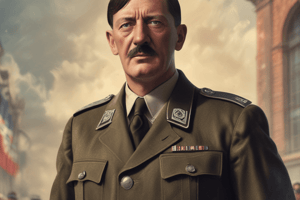Podcast
Questions and Answers
Within the historiography of World War II's origins, which perspective most accurately captures A.J.P. Taylor's sentiment regarding the role of individual decision-making?
Within the historiography of World War II's origins, which perspective most accurately captures A.J.P. Taylor's sentiment regarding the role of individual decision-making?
- The war was primarily the result of economic pressures exerted on nations, forcing them into aggressive postures for resource acquisition.
- The war was an inevitable outcome of deep-seated ideological clashes, irrespective of individual leaders' actions.
- The war was fundamentally a consequence of institutional inadequacies, specifically the League of Nations' failures, absolving individual leaders of direct responsibility.
- The war stemmed from a confluence of minor miscalculations by leaders lacking prescience, cumulatively fostering conditions conducive to conflict. (correct)
The policy of appeasement was solely motivated by a desire to buy time for military rearmament in Britain and France, without any consideration for public or political opposition to war.
The policy of appeasement was solely motivated by a desire to buy time for military rearmament in Britain and France, without any consideration for public or political opposition to war.
False (B)
Critically evaluate the assertion that the remilitarization of the Rhineland in 1936 serves as the sine qua non for subsequent Axis aggression, justifying its categorization as the singular, indispensable cause of World War II?
Critically evaluate the assertion that the remilitarization of the Rhineland in 1936 serves as the sine qua non for subsequent Axis aggression, justifying its categorization as the singular, indispensable cause of World War II?
While the remilitarization of the Rhineland was a significant event that emboldened Hitler, it was not the sole cause of World War II. Economic instability, institutional failure, and isolationism also played significant roles.
The failure of the ______ to effectively enforce collective security, exemplified by its inaction during Italy’s invasion of Abyssinia, significantly contributed to the escalation of pre-war tensions.
The failure of the ______ to effectively enforce collective security, exemplified by its inaction during Italy’s invasion of Abyssinia, significantly contributed to the escalation of pre-war tensions.
Match each historical event with its most direct consequence related to the broader context of appeasement and the road to World War II:
Match each historical event with its most direct consequence related to the broader context of appeasement and the road to World War II:
Considering the complex interplay of factors leading to World War II, which statement most accurately assesses the role of economic instability caused by the Great Depression?
Considering the complex interplay of factors leading to World War II, which statement most accurately assesses the role of economic instability caused by the Great Depression?
Examine the counterargument that appeasement bought valuable time for British rearmament. Which nuance undermines this justification?
Examine the counterargument that appeasement bought valuable time for British rearmament. Which nuance undermines this justification?
The annexation of Austria ( Anschluss ) by Germany in 1938 was met with immediate and forceful condemnation by the League of Nations, resulting in significant economic sanctions that deterred further German expansion.
The annexation of Austria ( Anschluss ) by Germany in 1938 was met with immediate and forceful condemnation by the League of Nations, resulting in significant economic sanctions that deterred further German expansion.
Elaborate on the inherent contradiction within Britain's policy of appeasement: a strategy intended to avert war whilst concurrently facilitating the expansion and consolidation of an overtly belligerent regime.
Elaborate on the inherent contradiction within Britain's policy of appeasement: a strategy intended to avert war whilst concurrently facilitating the expansion and consolidation of an overtly belligerent regime.
Assess the strategic implications of the Munich Agreement in the context of pre-war power dynamics. Which outcome most significantly destabilized European security?
Assess the strategic implications of the Munich Agreement in the context of pre-war power dynamics. Which outcome most significantly destabilized European security?
Consider a hypothetical scenario where, contrary to historical events, Britain and France had adopted a policy of resolute resistance against Germany's remilitarization of the Rhineland in 1936. Which of the following represents the most plausible counterfactual outcome regarding the broader trajectory of European geopolitics?
Consider a hypothetical scenario where, contrary to historical events, Britain and France had adopted a policy of resolute resistance against Germany's remilitarization of the Rhineland in 1936. Which of the following represents the most plausible counterfactual outcome regarding the broader trajectory of European geopolitics?
The Hossbach Memorandum unequivocally demonstrates that Hitler's strategic objectives were exclusively contingent upon the appeasement policies of Britain and France; absent such policies, his expansionist aims would have been fundamentally altered.
The Hossbach Memorandum unequivocally demonstrates that Hitler's strategic objectives were exclusively contingent upon the appeasement policies of Britain and France; absent such policies, his expansionist aims would have been fundamentally altered.
Elaborate on the multifaceted implications of the failure of Britain and France to uphold the territorial integrity of smaller states in the face of escalating German aggression during the period of appeasement. How did this perceived lack of resolve contribute to the destabilization of the interwar European order, specifically concerning the security calculations of nations such as Poland?
Elaborate on the multifaceted implications of the failure of Britain and France to uphold the territorial integrity of smaller states in the face of escalating German aggression during the period of appeasement. How did this perceived lack of resolve contribute to the destabilization of the interwar European order, specifically concerning the security calculations of nations such as Poland?
The concept of ________, as articulated in Mein Kampf, served as a foundational ideological underpinning for Hitler's expansionist policies, irrespective of the diplomatic strategies pursued by other European powers.
The concept of ________, as articulated in Mein Kampf, served as a foundational ideological underpinning for Hitler's expansionist policies, irrespective of the diplomatic strategies pursued by other European powers.
Match each historical event with its most significant consequence regarding the escalation of geopolitical tensions leading to World War II:
Match each historical event with its most significant consequence regarding the escalation of geopolitical tensions leading to World War II:
In what way did the policy of appeasement contribute to the broader geopolitical landscape, beyond its direct implications for German expansionism?
In what way did the policy of appeasement contribute to the broader geopolitical landscape, beyond its direct implications for German expansionism?
The historical record indicates a definitive causal relationship wherein appeasement was the singular and unavoidable antecedent to the outbreak of World War II, irrespective of other prevailing conditions.
The historical record indicates a definitive causal relationship wherein appeasement was the singular and unavoidable antecedent to the outbreak of World War II, irrespective of other prevailing conditions.
What were the critical elements that made the Anschluss possible?
What were the critical elements that made the Anschluss possible?
Examine the assertion that Hitler's foreign policy objectives, as articulated in Mein Kampf and other sources, were entirely independent of the actions or policies adopted by other nations. Which of the following statements provides the most nuanced assessment of this claim?
Examine the assertion that Hitler's foreign policy objectives, as articulated in Mein Kampf and other sources, were entirely independent of the actions or policies adopted by other nations. Which of the following statements provides the most nuanced assessment of this claim?
According to the alternate historical perspective, "Hitler did not have a blueprint for war and behaved much as any other ________ leader might have."
According to the alternate historical perspective, "Hitler did not have a blueprint for war and behaved much as any other ________ leader might have."
Flashcards
Appeasement
Appeasement
A policy of making concessions to an aggressor to avoid war.
Rhineland Remilitarization (1936)
Rhineland Remilitarization (1936)
Hitler's remilitarization of the Rhineland violated the Treaty of Versailles, but Britain and France took no action.
Anschluss with Austria (1938)
Anschluss with Austria (1938)
Germany annexed Austria in 1938 without facing opposition.
Munich Agreement (1938)
Munich Agreement (1938)
Signup and view all the flashcards
The Great Depression
The Great Depression
Signup and view all the flashcards
League of Nations Failure
League of Nations Failure
Signup and view all the flashcards
Lebensraum
Lebensraum
Signup and view all the flashcards
Strategic Delay
Strategic Delay
Signup and view all the flashcards
German Economic Crisis
German Economic Crisis
Signup and view all the flashcards
Abyssinian Crisis (1935).
Abyssinian Crisis (1935).
Signup and view all the flashcards
Undermined Faith
Undermined Faith
Signup and view all the flashcards
Poland
Poland
Signup and view all the flashcards
Emboldened Regimes
Emboldened Regimes
Signup and view all the flashcards
Appeasement's Role
Appeasement's Role
Signup and view all the flashcards
Mein Kampf
Mein Kampf
Signup and view all the flashcards
Hossbach Memorandum
Hossbach Memorandum
Signup and view all the flashcards
Anschluss
Anschluss
Signup and view all the flashcards
Study Notes
- Appeasement emboldened Hitler, leading to unchecked expansion and further aggression.
Remilitarization of the Rhineland (1936)
- Britain and France did not act despite clear violations of the Versailles Treaty.
Anschluss with Austria (1938)
- Germany annexed Austria without facing opposition.
Munich Agreement (1938)
- The Sudetenland was handed to Germany without Czech consent, reinforcing Hitler's belief in avoiding confrontation.
- Appeasement made Hitler’s expansion possible by underestimating his ambitions and overestimating the ability to control him.
- Britain and France were economically and militarily unprepared due to the Great Depression.
- There was strong public and political resistance to another war following WWI.
- Appeasement aimed to buy time for rearmament, despite temporary concessions to Germany.
- Appeasement emboldened Hitler, undermined European stability, and reflected the pragmatic need to delay conflict until Britain and France were better prepared for war.
- Appeasement alone cannot fully explain the outbreak of World War II
- A combination of other factors such as economic instability, institutional failure, and isolationism significantly shaped the path to war.
- The Great Depression destabilized global economies and politics, creating fertile ground for aggressive, authoritarian regimes in Germany, Italy, and Japan.
- Mass unemployment and hyperinflation in Germany fueled public desperation.
- Hitler’s expansionist policies were framed as solutions to Germany’s “excess population” and need for Lebensraum (living space).
- The League of Nations failed to enforce collective security, emboldening aggressor nations.
- There was inaction during Italy’s invasion of Abyssinia in 1935.
- The League failed to meaningfully intervene in the Spanish Civil War (1936–1939).
- This lack of enforcement signaled to Axis powers that violations of peace would face no meaningful consequences.
- The war was a result of a series of small decisions made by men with little foresight.
- Britain’s passive acceptance of the remilitarization of the Rhineland in 1936 allowed Hitler to gain confidence.
- Without appeasement, earlier violations might have faced resistance, potentially halting further escalation.
- Appeasement undermined smaller states’ faith in Britain and France as protectors, leaving them vulnerable.
- Poland became the next target after Hitler’s successes in Austria and Czechoslovakia.
- Appeasement emboldened other authoritarian regimes, such as Italy and Japan, to act more aggressively in their respective regions.
- The outbreak of World War II was not the inevitable result of appeasement alone, but rather a complex interplay of economic, political, and diplomatic failures.
- Hitler’s own ambitions were the driving force behind the outbreak of the war.
- Appeasement was just a helping factor.
- His foreign policy outlined in Mein Kampf, and Hossbach memorandum was completely independent of appeasement.
- He had ideas like Lebensraum, which he would aim to realize regardless of other nations actions.
- Appeasement allowed Hitler to execute and grow in power, which eventually allowed him to achieve his goals.
- During the case of Anschluss, when Hitler tried to cease the country with the intervention of an opposing nation, he failed.
- When Italy did not intervene, he succeeded.
- Hitlers aims were clear from the very beginning, and his actions did not regard decisions of other nations.
- In the case of Anchluss, he proved effective only when there was appeasement.
- There is a view that states "Hitler did not have a blueprint for war and behaved much as any other German leader might have."
Studying That Suits You
Use AI to generate personalized quizzes and flashcards to suit your learning preferences.





